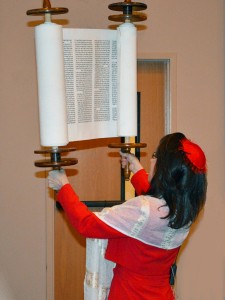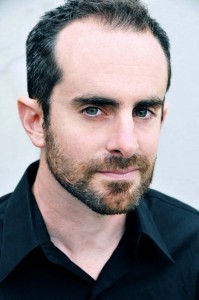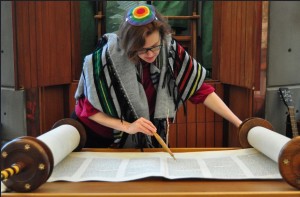What is Jewish Renewal? By Rabbi Dr. Barbara Thiede
Jewish Renewal is not a denomination. We like to say that we are post-denominational. Renewal rabbis, cantors, and rabbinic pastors work in all sorts of settings and in all sorts of synagogues, from Conservative to Reform to Reconstructionist to independent (like Temple Or Olam).
Jewish Renewal seeks the deep knowledge of Chassidic tradition and strives to reconnect that tradition to contemporary Jewish practice. Jewish Renewal understands halakha, Jewish law, as a constantly evolving creation to help establish the most humane and ethical of life practices.
Jewish Renewal joyfully embraces music, meditation, and storytelling in the practice of Judaism. Jewish Renewal reads Torah as our deepest challenge and our most precious gift.
Jewish Renewal cultivates an in-the-moment approach to prayer as well as attention and intention in regard to our liturgy’s deep roots and history.
Temple Or Olam is a congregation built on a Jewish Renewal principle: We are a sacred community. Our relationships and friendships are about godding the world toward a meshiachzeit we all long for, a time of real and lasting peace.
By renewing our understanding, our connections, our love of who we are, where we have been, and where we must go to make this world the one we hope and long for. We of Jewish Renewal can and long to do just that among fellow Jews and Muslims and Christians and Buddhists and agnostics and atheists and all the rest of humanity who are in pursuit of that thing we call a better world, a world renewed.
What is Jewish Renewal? By Rabbi Jay Michaelson
Like Reconstructionism before it — which has now thoroughly pervaded non-Orthodox Jewish theology — the impact of Renewal is far greater than the movement’s numbers. Reb Zalman once called Renewal Jews the “advance scouts” for the wider Jewish community…. But one of the core principles of Reb Zalman’s neo-Hasidism — that ritual and spiritual practice is meant to be a mode of self-exploration and self-transformation — has permeated Jewish life.
While it respects the structure of traditional Jewish services, Renewal also explores the power of varied musical forms; interpretive translations; chant; meditation; simultaneous Hebrew and English readings; silence; and movement to enhance the power of ancient words and music.
As I gradually drifted away from Orthodox practice, it was Renewal that offered an alternative. I had been raised Conservative, but found little “deep” spiritual practice in my home movement — especially in the first decade of the millennium. Reform never appealed to me personally. Only Renewal and Reconstructionism, the two intertwined mini-movements of American Jewish innovation, offered a replacement for immersive Orthodoxy. Meditation; creative ritual; thick pluralism; sex-positivity; personal introspection and transformation; a community of seekers…. The Judaism I came to practice was, in large part, the Judaism he [Rabbi Zalman] helped create: participatory and progressive, yet still committed to the powerful spirituality of traditional Jewish communities. Although Jewish Renewal is often stereotyped as “New Age,” it actually is quite uncompromising, refusing to sacrifice either progressive politics (in the broadest sense of the word) or the spiritual power of Hasidism and Kabbalah. Practice both-and, it insists.
What is Jewish Renewal? By Rabbi Rachel Barenblatt
Renewal is an attitude, not a denomination; adherents of Renewal come from all of the branches of Judaism. Renewal places emphasis on direct spiritual experience, and values accessibility over insularity…Renewal is a grassroots, transdenominational approach to Judaism which seeks to revitalize Judaism by drawing on the immanence-consciousness of feminism, the joy of Hasidism, the informed do-it-yourself spirit of the havurah movement, and the accumulated wisdom of centuries of tradition. We strive to imbue Judaism with an ecumenical, egalitarian, and post-triumphalist sensibility; to create innovative, accessible, and welcoming worship; to shape halakhah (Jewish law) into a living way of walking righteously; and to deepen the ongoing, joyful, and fundamental connection with God that’s at the heart of Jewish practice.







